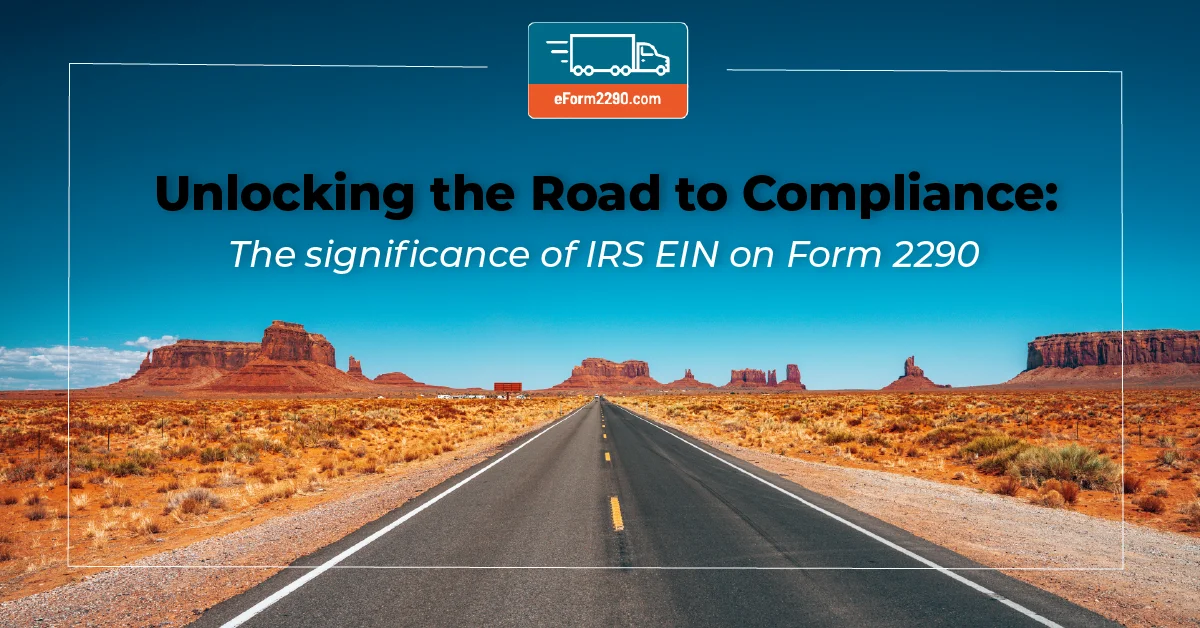Unlocking the Road to Compliance: The Significance of IRS EIN on Form 2290

Have you ever found the process of filing IRS Form 2290 a bit complex? For those utilizing eForm2290, the experience is consistently straightforward. However, within this streamlined process, the Employer Identification Number (EIN) assumes a pivotal role. As we navigate through the intricacies of Form 2290, it becomes crucial to comprehend the profound significance of the IRS EIN. In this comprehensive guide, we delve into the nuances of the EIN, its pivotal role concerning Form 2290, and why it deserves meticulous attention from every trucking business.
Understanding the Basics: What is EIN?
Before we dive into the intricacies of IRS EIN on Form 2290, let's establish a solid foundation by answering a fundamental question: What is EIN? The Employer Identification Number is a unique nine-digit identifier assigned by the IRS to businesses for tax purposes. Essentially, it serves as the business equivalent of a Social Security Number, ensuring accurate identification in various financial and tax transactions.


EIN and Form 2290: A Symbiotic Relationship
When it comes to heavy vehicle use tax filing, the IRS EIN is not just another bureaucratic requirement—it's the linchpin. Form 2290, the document through which truckers report and pay their HVUT, explicitly demands the inclusion of this identifier. But why is it so crucial? The answer lies in the legal framework and regulatory requirements set forth by the IRS.
Legal Imperatives: IRS EIN Requirements
Let's address the legal landscape first. The IRS mandates that businesses, including trucking entities, obtain an EIN. The heavy vehicle use tax, being a significant tax obligation, falls under this umbrella. Without a valid EIN, the Form 2290 submission lacks a vital component, rendering it incomplete and non-compliant. This underscores the importance of ensuring that your business has a duly assigned and up-to-date EIN for seamless HVUT filing.
Applying for an EIN: A Step-by-Step Guide
If your trucking business doesn't yet have an IRS EIN, fear not. Applying for one is a straightforward process. Visit the official IRS website, navigate to the EIN application section, and follow the step-by-step instructions. Common misconceptions around obtaining an EIN often revolve around complexity, but in reality, the process is designed to be accessible to businesses of all sizes.
EIN vs. SSN for Form 2290: Choosing the Right Identifier
While the IRS EIN is the preferred identifier for businesses, some may wonder about the option of using a Social Security Number (SSN) for Form 2290. It's crucial to differentiate between the two. The EIN is designed for businesses and entities, offering distinct advantages in terms of identity protection and professionalism. Choosing the right identifier is not merely a matter of preference—it's a strategic decision that can impact how your business is perceived and managed in the eyes of the IRS.
EIN Changes and Updates: Navigating Transitions
Businesses evolve, and with growth comes change. What if your trucking business undergoes structural modifications or a change in ownership? In such cases, updating or changing your EIN may become necessary. Understanding how to handle EIN updates is vital, especially in the context of Form 2290 filing. The IRS provides clear guidelines on when and how to initiate these changes to ensure continued compliance.
EIN and Business Structure: Tailoring Compliance to Your Entity
The type of business structure—whether sole proprietorship, partnership, corporation or another entity—has implications for EIN requirements. Different structures may have varying criteria for EIN acquisition. For trucking businesses, aligning your understanding of EIN requirements with your specific entity type ensures accurate compliance with Form 2290 obligations.
Penalties for Incorrect EIN Usage: Navigating the Consequences
Providing an incorrect or invalid EIN on Form 2290 comes with consequences. The IRS takes compliance seriously, and non-compliance can result in penalties. It's crucial to double-check the accuracy of your EIN when filing HVUT to avoid unnecessary complications. The penalties for inaccuracies serve as a reminder of the importance of precision in tax-related documentation.
EIN Security Measures: Safeguarding Your Identifier
The IRS EIN is an important identifier for your business, and as such, it requires careful safeguarding. Implementing robust security measures to protect your EIN from unauthorized use is essential. This includes educating relevant personnel about the sensitivity of EIN information and ensuring that it is shared securely within your organization.
Future Changes and EIN Implications: Staying Ahead of the Curve
The regulatory landscape is dynamic, and changes may occur that impact EIN requirements for heavy vehicle use tax filings. Businesses must stay informed and prepared for any updates from the IRS. Anticipating future changes ensures that your trucking business can adapt seamlessly to evolving compliance standards.


Conclusion: Charting a Course for Success with EIN
In the world of heavy vehicle use tax filing, the EIN is not merely a numerical identifier—it's the key to unlocking compliance and ensuring the smooth operation of your trucking business. From legal requirements and applications to security measures and real-life examples, understanding the significance of your EIN on Form 2290 is a journey toward seamless compliance.
As you proceed on this journey, always keep in mind the wisdom: 'Luckiest are the prepared.' Equip yourself with the knowledge and a deep understanding of the EIN and other crucial elements. This preparation will enable you to navigate the road to HVUT compliance with ease and confidence. Stay tuned for more insightful information from us.